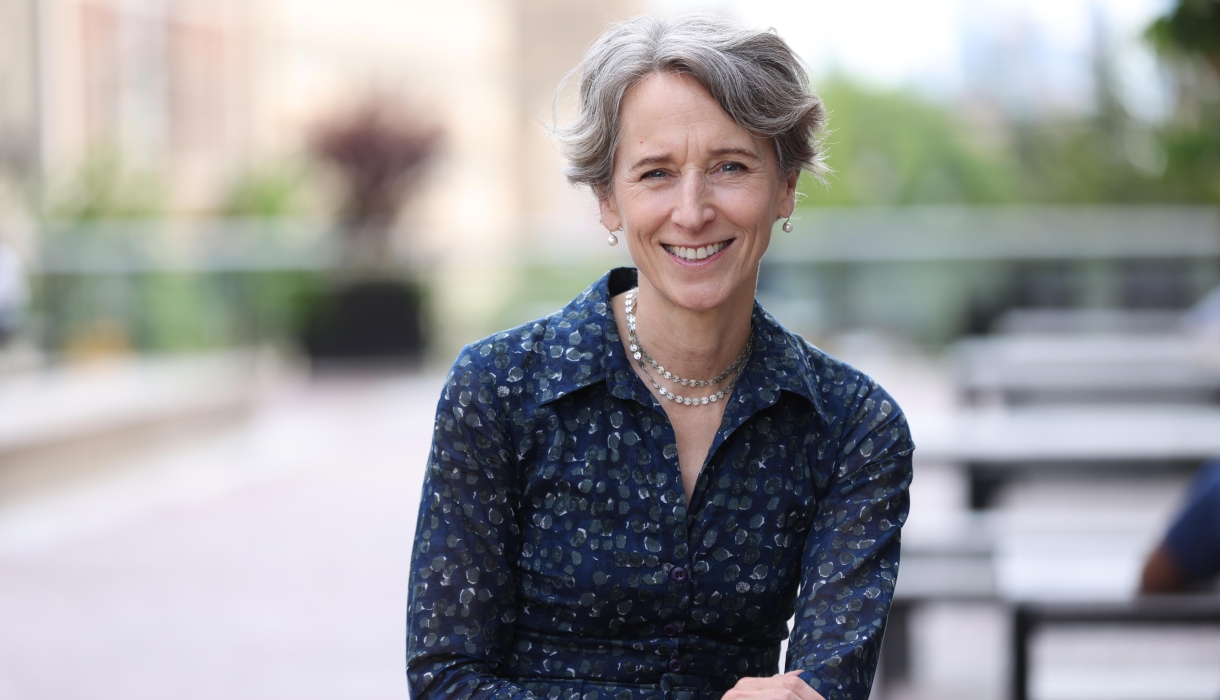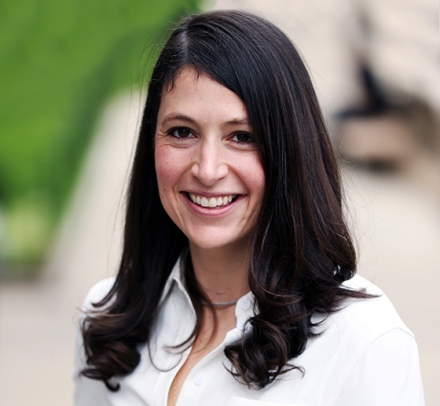Clare Huntington ’96: Expanding Family Law Beyond the Marriage Plot
The family and poverty law expert returns to her alma mater as a professor of law.

In Professor Clare Huntington’s class, there will be a final exam. On the first day.
“It helps students understand where we’re going, and what we’re going to be talking about. And usually, students have terrific intuitions about something they’ve never even thought about,” Huntington says. “I give them half an hour to read the exam question and outline their answer. And then we spend half an hour going over it.”
Huntington, who joined the Columbia Law faculty as a professor of law on July 1, teaches family law, poverty law, and legislation and regulation. In her career as a legal scholar, she has spent time not only delving into her academic specialty but also studying how to teach it effectively.
“There’s a whole body of literature on adult learning theory, and I read a lot of that and then try and implement the insights in my classroom,” she says. “Adults need to know why they need to know something in order to learn it. So I really try to emphasize that.”
Hence the first-day final. (Spoiler alert: It isn’t graded. The real final exam takes place during the exam period, and the question is different. This is law school, after all.)
Huntington also mixes up her class presentations to accommodate different learning styles: Some students learn better through visual representations of ideas, some get it through simulation exercises, some through reading. Instead of straight cold calls, she selects pairs of students to confer with each other and answer together, or she tells the whole class to discuss the question with the person sitting next to them.
“It forces an immediate collaboration. That’s what we all do in our lives; we work with other people,” she says. “And the more practice we get collaborating, the better.”
Clearly, there’s a reason Huntington was named Teacher of the Year at Fordham University Law School, where she taught before first coming to Columbia in 2022 as Nathaniel Fensterstock Visiting Professor of Law.
Her faculty appointment means she is now a colleague with the professor who first taught her family law—Carol Sanger, Barbara Aronstein Black Professor of Law—and with Elizabeth Scott, Harold R. Medina Professor Emerita of Law, with whom Huntington often co-authors journal articles and works on the American Law Institute’s Restatement of the Law, Children and the Law.
“There’s really no better place than Columbia, and I mean that both personally and professionally,” Huntington says. “It feels like coming home in many ways.”
One of Columbia Law’s great strengths, she says, is its commitment to both theory and practice, “and an integration of the two.” Huntington is already collaborating with Clinical Professor of Law Josh Gupta-Kagan on a plan to have students from the Family Defense Clinic give presentations about their cases in her family law class.
“To hear your peers talk about what they’re doing in family court in Harlem with the Neighborhood Defender Service is just going to make [legal doctrine and theory] that much more real,” she says. “The idea is to prepare students, to understand how the system works, think critically about it, and then know how to operate within it. What do lawyers do, and what are the pressure points for making change?”
Working Back to a Focus on Families
Huntington has combined practice and theory in her own career: She enrolled at Columbia Law after serving as a caseworker in the New York City foster care system. She worked with families in the then new area of “kinship care,” which places children with extended family members rather than foster parents unknown to the children.
“I’ve always been interested in relationships. If I wasn’t a lawyer, I probably would be a therapist,” she says. “I knew I wanted to do policy work around children and families, and I figured, why not get a J.D. instead of a master’s in public policy? But then I came to Columbia and fell in love with the law.”
After Columbia, Huntington clerked for Judge Denise Cote ’75 in the U.S. District Court for the Southern District of New York and Merrick Garland in the U.S. Court of Appeals for the District of Columbia Circuit during his first year on the bench. At the Supreme Court, she clerked for then retired Justice Harry Blackmun and his successor, Justice Stephen Breyer. She went on to the Office of Legal Counsel in the U.S. Department of Justice, where she practiced constitutional law and worked on family law cases pro bono.
As a clerk at the highest court, Huntington met a number of law school deans looking for future academics. In 2004, she and her husband, Nestor Davidson ’97, decided to try teaching law. A brochure from the University of Colorado Law School had lingered in her desk drawer: Boulder, Colorado, was a location where Huntington could also indulge her love of hiking and mountain climbing. She pulled the brochure out.
“It wasn’t a grand plan except that, for me, it was an opportunity to dig back into focusing on children and families,” Huntington says of entering academia. “We were incredibly grateful that the University of Colorado Law School took both of us.”
Joining academia allowed Huntington to devote herself once again to family law. While she valued her direct work with families in crisis, “I was more interested in systemic change. That’s the great thing about being an academic. We are training lawyers to go out and do the work—and I have many former students who are out there doing extraordinary work with children and families. And then, in my writing, I get to consider how the systems work and don’t work.”
Huntington and her family returned to New York in 2011 so she and Davidson could take teaching positions at Fordham Law. (The relocation didn’t stop her outdoor adventures: Last summer, Huntington and one of her children climbed Alaska’s Denali.) The family lives in Park Slope, where she grows vegetables in the backyard and, for a time, even kept chickens. The flock fared fine in Brooklyn, but when they were transported to New Hampshire for a summer, carnage ensued. Hawks, foxes, and bears all had their way with the brood.
“It was like an Agatha Christie novel,” she says. “Every day, we’d lose a chicken.”
What the Law Thinks Families Look Like
Huntington still remembers the casebook from her first family law class at Columbia. The contents, she says, were “basically marriage and divorce.” Now, “I use a casebook that doesn’t start with marriage. It doesn’t assume that marriage is the center of family life—because it’s not for many families.”
Today, 40% of children are born to parents who aren’t married, and most of those parents don’t marry later. The “decentralization of marriage” is the biggest change in the family landscape over the three decades she has been working in the field, Huntington says. “Yet family law hasn’t caught up. … A lot of what I’m teaching students is, what does family law assume family life looks like? It assumes parents are married, and that if they end their relationship, they’ll go get a divorce, and they’ll go to court. For many families, that’s just not true. There are many, many ways in which family law needs to be updated to reflect changes in society,” she says. That disconnect is the subject of her 2014 book, Failure to Flourish: How Law Undermines Family Relationships.
A recent article, co-authored with Naomi Cahn and Elizabeth Scott, looks at how current family law ignores the growing cohort of older adults who form families not centered around child-rearing or mutual economic support. “Older people are very much in family relationships. But those families look different. Older people oftentimes don’t want to remarry, but they want to have a partner,” she says. “And yet the law offers only one kind of relationship: marriage, with all its attendant obligations.” Or a family may consist of older adults in non-marital relationships or a group of people in an “intentional community”—which also go unrecognized by family law. The law also makes it harder for older adults to receive the family care they want and need. Many older adults live near adult children, but zoning laws make this harder, often forbidding “accessory dwelling units” or “granny flats’’ that allow adult children to care for elderly parents.
Huntington also focuses on parental rights, which she and Scott call “the backbone of family law.” The term parental rights, however, is currently in the news for its use in highly partisan disputes over education. “The political use of parental rights is very much parental rights as rhetoric rather than as doctrine,” she says. Her focus is on the latter: how parental rights “protect parents from the intervention of the state.’’ That idea comes into play, for example, with regard to gender-affirming care for minors. “We’ve long said that parents get to make medical decisions for their children,” she says.
Her next subject: educational decline and underemployment among American young men, and the implications for family law. The freedom to push family law research forward “is an extraordinary privilege,” Huntington says. “I get to indulge my intellectual curiosity every day, all day, and then bring that to the classroom.”
